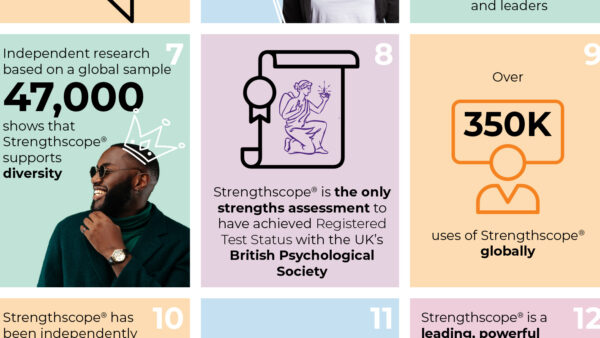First up, a message to you. This is my podcast number 100. So a heartfelt thank you from me to you for listening to the podcasts, for sharing and liking them and for telling others about them. I’m told that they make a big difference, so I just wanted to say thank you for playing your part – a podcast’s not a podcast without an audience.
Onto today’s topic,
Wellbeing at work
There’s no doubt, wellbeing at work is a hotter topic than ever and rightly so. We’re regularly being told that employees’ mental health is worsening and that stress-related absence is on the increase. According to the UK’s official HR-representing body (the CIPD) between 2018-19, work-related stress increased in 40% of organisations and reporting of mental health conditions increased by 60%.
Now this may be in part to do with the reduction of stigma associated with mental health and stress which is a good thing but nonetheless, the figures are stark. And events of 2020 will have an additional significant impact, once the data is in. So today I want to talk to you about how strengths can help boost your wellbeing at work with some practical tips on doing that.
My name’s Dr Paul Brewerton, the strengths guy, PhD in Psychology and Founder of Strengthscope, the leading strengths assessment system. My podcasts run first thing each week to get you off to a strong and positive start and I focus on wide-ranging life and work topics but always from a strengths perspective.
My tips on how to practically boost your wellbeing at work relate to four areas and how your strengths can help: mental health, finding your purpose, managing stress and building out your strengths network. There are plenty more podcasts to listen to in my back catalogue on wellbeing in its broadest sense, too many to mention here, so please have a check back and see what takes your fancy.
Mental health at work
So let’s start with positive mental health at work – for example, reducing anxiety, increasing engagement and reducing any symptoms of depression. In short, knowing and using your strength – those qualities which energise you and which you are great at, or have the potential to become great at – can help you feel more in control of work situations, more capable of taking on challenges and more engaged in your work because you are actively playing to areas of strength.
For example, I have a Decisiveness strength – meaning that I’m energised by making quick and tough decisions to keep things moving forward. Now, I can choose to use that strength when I find that either me or someone in my team is getting stuck in a pattern which isn’t working for them. Making the decision to use that strength for good gives me a sense of my own value, so boosting my self-esteem; it also makes me feel as though I have choice and I’m not trapped, so mitigating feelings of anxiety by giving me a sense of power rather than helplessness; and it will allow me to do something I enjoy, upping my engagement.
So Tip 1 is to find out which strengths describe you at your best, what they look like when they’re at their best (from your point of view and from the viewpoint of others that work with), and then start to actively bring them into play more of the time.
Find a sense of purpose
Secondly, to use your strengths to improve your wellbeing at work, finding a sense of purpose can give a real profound positive boost to how you feel about work and the world in general.
Big questions here: what’s the point of you, what’s the difference you’re proud of making in the world or that you want to make in the world? To help with that, you may want to reflect on what in your life and in your work life brings you the greatest joy? Where you feel at your most natural and authentic and most effortlessly, easily you?
It’s likely that in those moments, there will be a coming together of your strengths as well as what you value, so you’re moving there into purpose territory. As a personal example, I am driven to make a positive difference in the world by helping others to discover and acknowledge what they love and then nudge them towards that place if and when they’re ready. My strengths of Empathy (putting myself in someone else’s shoes) and Collaboration (finding a goal in common between me and another) allow me to be me at the same time as helping others.
I also have a particular set of skills and experience around turning ideas into practical career and business opportunities. So combining my strengths with my purpose (and my skills actually) gives me the biggest possible boost to my wellbeing. It’s the most incredible feeling when it all comes together.
So Tip 2 then is to find out the point of you, to establish what difference you want to make in the world. And then, to figure out how you can use your strengths to get there!
Managing stress at work
Third on my wellbeing tips list is managing stress at work. Strengths are a positive force for good, most of the time. But like anything, too much of a good thing can become a less good thing and strengths have their shadow side. So my Tip 3 is to know when your strengths have a tendency to go into overdrive and have a strategy for dealing with it.
For most people, one or two strengths that they have will show an overdrive tendency in certain circumstances. So do the work to find that out. It will make a big difference to how well you can manage stress at work without stress managing you.
One of my overdrive risks is that I can get over-Enthusiastic when I’m under pressure, probably in the hope that I can convince others to get excited and on board too. Trouble is, over-enthusiasm can look to others like Over-the-top dramatics or even railroading others through sheer force of will, so won’t have my intended effect at all, as they withdraw or stop listening or stop taking what I say seriously. All of which will have the effect of causing me even more stress as I feel more isolated and less connected with them.
My antidote to this is to bring into play a strength I’ve already mentioned: Empathy and to genuinely listen. I’ll probably need to change my state to do this properly but it will be worth it as by empathising, I can bring in other people’s points of view, feel more connected and not feel like I have to be the one doing all the enthusing.
So, my practical takeaway here is to take a long hard objective look at your own behaviour and overdrive tendencies – identify the trigger situations or people that can affect that overdrive and then plan your strategies to limit the risk of it happening, at the same time, reducing your stress and improving your wellbeing at work.
Build out your strengths network
Lastly, I encourage you to see your network through a strengths lens and create new connections by offering and borrowing on strengths. Decades of research have shown that a strong network of support can reduce symptoms of depression by improving a sense of meaningful connection; of course, this has a big implication for wellbeing at work.
How strengths can help is by getting to know your own strengths better and being able to offer those out in a way that will create the most value for others, boosting your self-esteem and self-worth. As well, asking for help from others in areas which drain you, so borrowing on other people’s strengths which brings them the gift of a self-esteem boost and brings you the gift of giving them that gift, plus getting the help you need in areas where you don’t feel as confident.
The more you do it, the greater a sense of “connectedness” you’ll feel and the more you’ll remember to call on others when you need it, plus offer help to them when they do. Tip 4 then is to borrow others’ strengths when you need help.
In Summary then, my 4 practical tips to improve wellbeing are:
1. Find your own personal strengths that define you at your best and decide how you can use them more – this can help reduce symptoms of anxiety and depression and increase engagement.
2. Find your purpose, the difference you want to make in the world, and figure out how you can use your strengths to get you there.
3. Discover your overdrive risks, when they’re most likely to turn up and then have a plan to stop them stressing you, so you stay more in control of you.
4. Borrow others’ strengths when you need help and offer them yours when they do.
This podcast is available on all major podcast platforms. Find it on Apple podcasts, Spotify, Google podcasts, Stitcher, ACast, TuneIn, Breaker and Soundcloud. Make sure to check out the back catalogue and subscribe to get them at the start of the working week!









